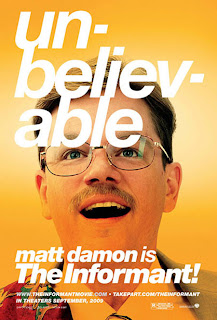
Unbelievable is Right - The Film is Informative But Flawed
The Informant!
Movie Review
I wonder how the pitch for this movie went. Steven Soderbergh, director of Ocean's 11 through 13, bowls into the office of a besuited studio executive, ready to give the lowdown on his latest feature project. It turns out that the Academy-Award winning director wants to adapt a book called The Informant, written about price-fixing in the lysine industry. The suit nods along as Soderbergh discusses his plans; he's thinking of The Insider, and how that film, although lauded by critics, didn't perform too well at the box office. This movie is going to need something different, something extra. Almost on cue, Soderbergh says the same. The suit is impressed, until he hears that the director wants to make a dark comedy. That's when the nodding stops.
The Informant! tells the story of Mark Whitacre (Matt Damon), who outed a worldwide lysine price-fixing ring in the mid nineties. He confesses one night to an FBI agent (Scott “Quantum Leap” Bakula) who has been brought in to work on an unrelated extortion case. This is unusual in itself because, first of all, the agent didn't know a thing about the conspiracy, but also because Whitacre had a lot to lose from co-operating (he was the highest-ranking whistleblower in US legal history, and was swiftly ascending the company ladder when he confessed). As the agents spend time with their inside man, they begin to find that he has problems of his own, and is not as squeaky clean as he appeared at first blush.
Let me cut straight to the nub of what's wrong with this film; the third act sucks a donkey's nether regions. The first hour or so of the movie trundles along nicely. I was sucked into the plot pretty early and it was holding my interest, despite the fact that the jokes weren't exactly flying. Matt Damon's take on Mark Whitacre is quietly endearing, and his voice-over asides are the most enjoyable element of the film. The small man taking down a big company dynamic was floating my boat, and I was engaged, if not ecstatically overjoyed.
Then the movie fell apart. Whitacre is exposed as a fraudster who has been battling with bipolar disorder, and the focus of the film shifts from his battle with his employer, to a personal fight to keep a grip on reality whilst avoiding prison himself. It's all introspection from there to the credits; in one easy step the forward thrust of the plot stalls, and Whitacre goes from lovable weirdo to pathologic liar.
I'm convinced that the reason Matt Damon is such a good actor is because he seems like he would be a blank slate off camera. He seems to have an uncanny ability to slot the fragments of his personality into whatever character he is currently portraying. I wholeheartedly believe that if I were ever to meet the man in real life, he would speak like a robot.
Soderbergh does his usual slick job here. He seems to have a knack for picking unusual projects, and making them more than they appear on paper; exactly what a good director should do, I suppose. Between the two of them, director and leading man have synthesised a similar comedic style to the Ocean's movies, all pauses and music cues. It works well, and softens the eventual drop-off.
Go to see this movie if you're hard up for unwatched new releases, but be aware, everything from the beginning of the third act is a shocking waste of time. You have been informed.
6/10







